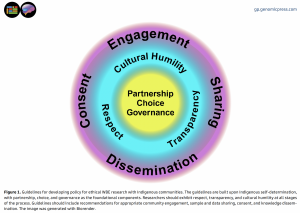
New study calls for ethical framework to protect Indigenous genetic privacy in wastewater monitoring
Researchers outline critical safeguards needed to balance public health benefits with Indigenous data sovereignty rights
The study, published today in Genomic Psychiatry (Genomic Press New York), examines how the analysis of community wastewater – while valuable for public health monitoring – raises significant privacy concerns for Indigenous populations.
"Wastewater-based epidemiology has revolutionized how we track disease patterns and community health indicators," explains Dr. Melissa Perreault, co-lead author from the Department of Biomedical Sciences at the University of Guelph. "However, the technology's ability to capture detailed genetic information creates unique risks for Indigenous communities, who have historically faced exploitation in genetic research."
The research highlights how wastewater samples can reveal sensitive information about community health, including genetic predispositions, disease prevalence, and medication use patterns. For Indigenous communities occupying distinct geographical areas, this detailed biological data collection presents particular privacy challenges.
Professor Lawrence Goodridge, who also led the study, emphasizes that DNA can persist in wastewater samples indefinitely when properly stored. "What many don't realize is that genetic material in purified wastewater extracts stored at -80°C shows minimal degradation even after two years. This long-term stability of genetic information raises important questions about data sovereignty."
The paper draws critical parallels between current wastewater surveillance challenges and historical cases where Indigenous genetic information was misused. These examples include unauthorized genetic ancestry research on the Nuu-chah-nulth First Nations' blood samples and the controversial Havasupai diabetes study that led to unauthorized mental health research.
Key recommendations from the study include:
• Development of specialized ethical guidelines for wastewater surveillance in Indigenous communities
• Implementation of robust consent processes that respect Indigenous governance structures
• Creation of clear protocols for sample storage, sharing, and destruction
• Establishment of Indigenous data sovereignty frameworks
• Integration of traditional ecological knowledge into surveillance practices
The researchers emphasize that these frameworks must balance public health benefits with stringent privacy protections through authentic community engagement. "Indigenous communities must have full control over how their wastewater data is collected, used, and shared," Professor Perreault states.
The publication coincides with growing global interest in wastewater-based epidemiology, particularly following its successful use during the COVID-19 pandemic. The researchers argue that establishing ethical guidelines now is crucial as the technology's applications continue to expand.
The full peer-reviewed Perspective (review) article, titled "Indigenous data protection in wastewater surveillance: balancing public health monitoring with privacy rights," is available on 25 February 2025 in Genomic Psychiatry, offering readers a comprehensive examination of how wastewater-based epidemiology raises critical privacy and ethical concerns for Indigenous communities while suggesting frameworks for responsible implementation. The article is freely available online at https://doi.org/10.61373/gp025p.0008.
About Genomic Psychiatry – Genomic Psychiatry: Advancing Science from Genes to Society (ISSN: 2997-2388) represents a paradigm shift in genetics journals by interweaving advances in genomics and genetics with progress in all other areas of contemporary psychiatry. Genomic Psychiatry publishes peer-reviewed medical research articles of the highest quality from any area within the continuum that goes from genes and molecules to neuroscience, clinical psychiatry, and public health.
Melissa Perreault
University of Guelph
perreaum@uoguelph.ca
Visit us on social media:
Facebook
X
LinkedIn
Instagram
Other
Distribution channels: Environment, Healthcare & Pharmaceuticals Industry, Human Rights, Waste Management, World & Regional
Legal Disclaimer:
EIN Presswire provides this news content "as is" without warranty of any kind. We do not accept any responsibility or liability for the accuracy, content, images, videos, licenses, completeness, legality, or reliability of the information contained in this article. If you have any complaints or copyright issues related to this article, kindly contact the author above.
Submit your press release


